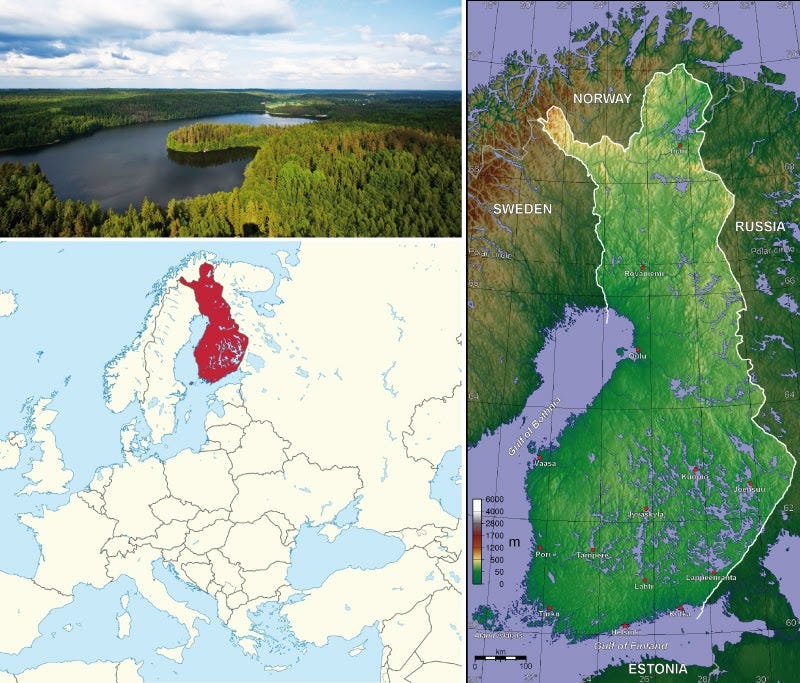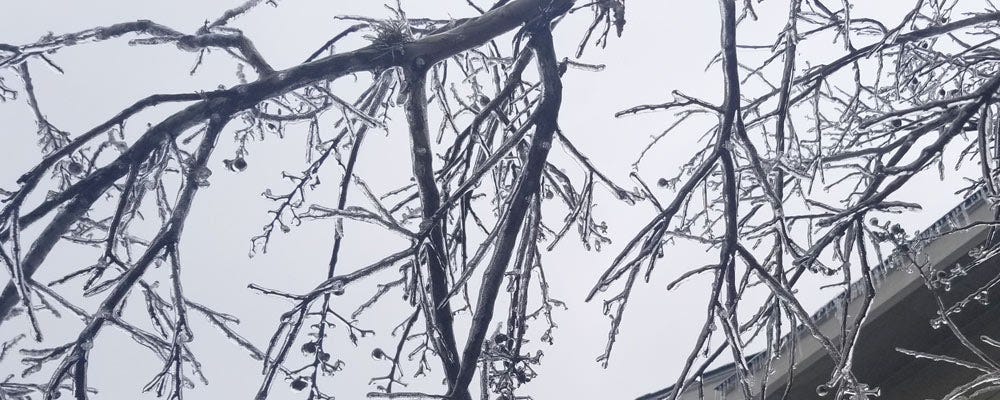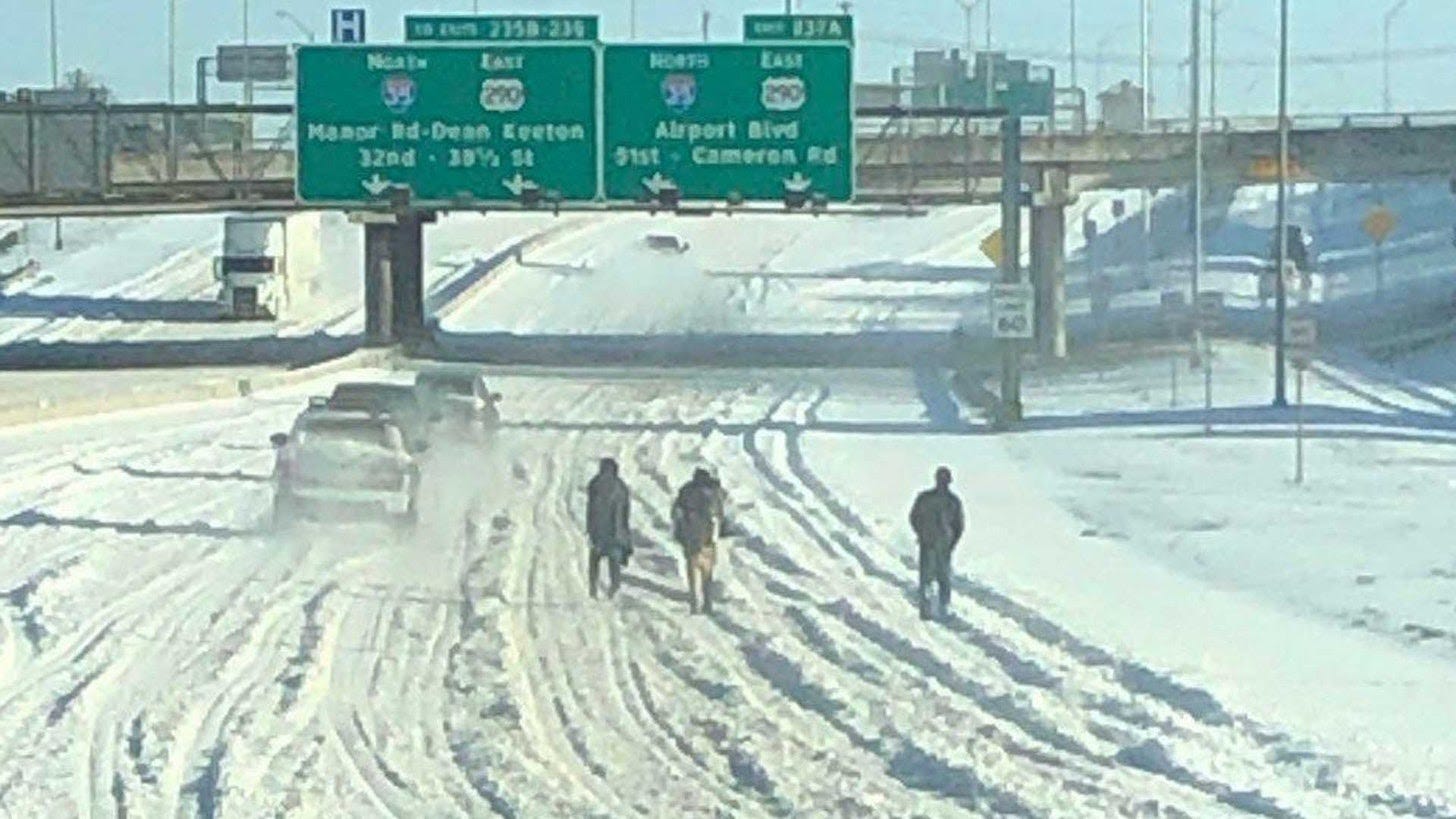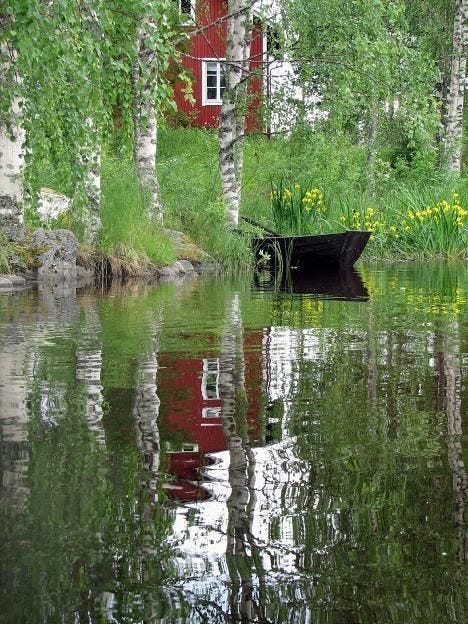Duke Tales: I see Finland in the strangest places
A history of Finnish genes and culture: part 1 of 6
The rest of the series.
Part two: Weirdness as a national pastime: culture
Part three: Go West Young Siberian: genetics findings
Part four: From deepest Siberia to Europe’s edge
Part five: Frontier Finns: cabins, rakes & Indians
Part six: Finnish brains, baiting and bottlenecks
Even though this is an Austin story, it’s part one in a six-part series about the Finnish people, their unique culture and their unique genetics. I look at the stranger-than-fiction stories the past 20 years of genetic innovation have verified about who Finns are, how they got to Finland and all the other unexpected places their genes show up.
This piece is free; the remaining five chapters are for paid subscribers.
If anyone has ever tried to tell you Finns are weird and primitive (I’m looking at you, other Europeans), today’s story about my friend Duke and me is for you.
I met “Duke” the day I moved in. He walked up to me on the street and pulled up his shirt to show me a seeping gash. I gave him what cash I had and called my wife in shock. Since then, I don’t want to think about how much I’ve forked over for Duke’s emergencies. Lots of times he urgently needed gas at the last minute to go see his daughter. Or he’s out of propane. Or he swings by in the evenings, rattling and recounting the coins in one palm, giving me puppy dog eyes about how he just needs 30 more cents for a beer. One year I counted and he had three birthdays. In my absence, he buttonholed my brother who was visiting, and said I owed him lots of money, intimating that it would be wise for my brother to settle the debt.
There was the time he came over ashen-faced, confiding that he was bleeding bad, ashamed for my wife to hear specifics. He needed money to get to the VA. We worried about him for two solid days and then there he was again, tooling down the street, looking carefree and half his age on his ten-speed. Actually, he said, it was just that he’d swallowed some glass while opening a beer with his teeth. He’d kinda felt it at the time but figured it would be OK. Anyway, he was on the mend.
More than once his tent has gone up in flames and he rings the bell late at night, in urgent need of a “loan” to go get another one. Duke grew up in this neighborhood. The house his parents raised him and his siblings in is boarded up, unused. I assume it’s condemned. Sometimes he grouses about his successful siblings who are long gone, busy with their careers. They’re in no hurry to sell the lot. They know how gentrification works and they’re playing the long game. That property value needs to get a lot higher before they’ll sign. Duke’s outnumbered. So he does what he needs to do.
He overcharges me to mow my tiny patch of lawn, he winsomely accosts unprepared passersby, he does odd jobs around the neighborhood. Once he offered to take a mess of cardboard off my hands and my wife got all excited that the recycling markets were up again. But I hadn’t been listening closely enough and he just wanted me to pay him to flatten all those boxes.
Over time, I’ve developed a certain loyalty to Duke. I get mildly affronted when an Uber driver dropping me off looks out at Duke warily, asking are you sure it’s OK if I leave? I appreciate the way Duke keeps an eye on the neighborhood. He calls me Rasheed, avails himself of my tap water, and charges his collection of half-functioning cell phones at my outlet. His animosity towards the neighborhood Tech Bros who eat out or get all their meals delivered, in addition to receiving endless mounds of Amazon packages entertains me even though I’m more like them than I’d like. They get up from their computers to run wind sprints together occasionally, looking doughy and miserable. Duke ambles past, lean as hell from an honest day’s hustle, a diet of beer (and glass) and daily trips lugging buckets of water.
All of this to say that my boy Duke lives a pretty marginal life. The Hobbesian phrase “solitary, poor, nasty, brutish, and short” can feel apt. His life looks… weird. I wouldn’t want it and it isn’t like anyone else’s I know. And yet…
When the going gets tough, the weird...
On Valentines Day this year, it had begun snowing and the roads were getting icy. My wife isn’t much of a Duke benefactor, but she started worrying about him in his tent. The completely implausible Texas lows we’d been watching in the extended forecast were upon us. Single-degree temperatures in a Texas tent is no joke. We don’t have much, but she begged him to consider sleeping in our unfinished room where he could at least have our space heater, four walls, and a sofa to sleep on. He wasn’t interested. His back hunched against the wind, he showed us how his bare hands were stiffening in the chill. But he didn’t need any dumb sofa. He just needed money for propane. The usual.
We thought he was crazy. We worried about what state he’d be in the next time we saw him. Actually, the next time we saw Duke, he was in the exact same state as always. Chipper, talking fast, needed to “borrow” more money for propane, his brother was going to drive out and bring him cash once the highways were cleared.
We on the other hand were living in our driveway. Camped out in our car, we had heat, we could charge our phones and there was space to sleep in something approaching comfort. In the daylight, the kids spread out their Legos, got on their tablets, drew pictures, and read. Pretty much their usual, except that they had to bundle up to venture into the frigid house to pee or brush their teeth. It was the middle of a pandemic; our fridge was packed. We were lucky. We had running water and our gas never went out, so we could brave the house to boil water and cook simple warm meals. But I spent most of those four days with a blanket pulled over my head, wishing myself asleep. I did enough blizzards and cold in my childhood. I’m not into roughing it.
While our neighborhood, Duke’s neighborhood languished in eerie stillness without traffic or power into a fourth day, across the freeway, lights were always ablaze in the high-rise hotels. The best rates we saw were $600 and up a night. That’s where one of the Tech Bros was returning to when we spoke to each other for the first time. He slowed his luxury SUV and asked with feeling if we were doing OK. We had our first conversation there in the driveway. He looked a little wild-eyed and said something confusing about going to his office for the first time in six months to see if there was any food to scavenge. Just-in-time supply chains, a relatively unlimited budget, and Austin’s robust open market in meal delivery were not seeing him through this crisis. Was there really no food at $600+ hotels?
Duke meanwhile had just one question. He peeked his head into the car. You charging phones in there? One of Duke’s phones was really fiddly to charge. Now I understood why he always seemed to be crouched over my outlet, fussing with a charger. It flashed text warnings about how no charger was inserted. When we apologetically returned it, he said oh naw, it does that. He narrated the process, explaining how you plug it in, it turns on, then it lights up with the logo, then you get this screen, then the screen goes black and then that little red light goes on. And that means it’s charging and you can leave it. We protested that the message said it wasn’t charging. He wasn’t interested: oh it always does that screen before the little red light goes on. And then you good. Whether Duke had once read that warning and found it best to ignore or didn’t actually read text at all wasn’t clear. Either way, he was right. It charged.
A quiet life
What could a man like Duke have to do with the genetics of Finns, one of the world’s most technologically advanced, high-trust, literate societies? Duke lives in a tent with a Pit Bull and a powerful propane heater. He rides a ten-speed, cadges water from people around the neighborhood, dries his laundry on the line, charges his phone outside my house, is an amiable drunk, and rocks a salad-days physique (and immaculate sneaks) in his sixth decade. He lives in a metropolitan area in an eternal growth spurt, awash in easy tech money, with a median household income of $80,000, but hits me up in increments of 30 cents for beer.
But in the middle of a global pandemic, a freak ice storm hit, the electrical grid collapsed overnight, and most commerce and transport ground to a halt for a week. I weathered this, slumped under a blanket, texting my friends about everyone’s water and electrical status. The Tech Bros high-tailed it to a luxury hotel. And my prepper friend’s carefully researched generators turned out not to be rated for 17 degrees and below and failed. We all had resources and various series of safety nets. Where was Duke who had basically none of those things?
Duke was walking a mile through the unplowed streets to bring us the jerry can of gas my wife requested. The gas station minimart was cleaned out, including of gas cans, so Duke backtracked to a friend who sensed my wife’s cash in his pocket and required rent for the use of his plastic gas can. After lugging the full can back and topping up our tank, Duke trekked back to drop off the can. And then he carried on with all the odd jobs people needed him for.
Once the sun came out again and the snow started melting, there were still days of eerie stillness without hulking Amazon, UPS and FedEx trucks rounding the corner throughout the day, and many fewer people absently walking their dogs, phone in hand at all hours. Even USPS’s zippy little trucks took an age to return to the streets. But Duke didn’t seem to give the standstill around him another thought. Asked if it had ever been this cold here before, he misunderstood the question and answered absently, Sheeee-it, people crying about no power for a few days. Try living without power for 20 years!
Civilize this
When we talk about the history of human civilization, we’re often focused on the societies around the lip of the Mediterranean, the Rhine valley, the Rhone valley, the Po Valley, etc. But Europe for one hasn’t only been rich loess and river valleys, deep-rooted civilizations, sophisticated literary cultures, and complex conurbations.
Europe is also Finland, a beautifully remote and marginal land raked with thousands of lakes. It can be about as accommodating as a winter week during a global pandemic, overlaid with a freak ice storm, no snowplows, a collapsed electrical grid and commerce, and transport grinding to a halt. Finland, in other words, has not always been ideal for the equivalent of the Tech Bros and me. Certainly in the past, our counterparts who might have been doing very nicely for themselves in the knowledge centers of the heart of Europe would have been the first to be culled by what mother nature continually meted out to her hardy Finnish subjects.
My actual friend Duke would not be remotely optimized for Finland now or in the past, but humans as content and at ease with a spartan, unfussy, marginal, self-reliant (or raiding!) existence clearly once were. Over the centuries, commentators, especially skeptical fellow Europeans have speculated, often uncharitably, about the marked weirdness of the Finnish people and whether their apparent lack of refinement reflected a primitive, unimproved state. The truth is quite a bit more interesting. Finnish blends of ancient ancestry don’t suggest some archaically primitive relict group at all; in fact, a tell-tale tranche of their ancestry is startlingly recent, the last triumphant arrivals to an inhospitable land. And among many other interesting stories, Finnish genomes can now show us that where the prehistoric Finnish equivalent of Tex-pocalypse Tech Bros and Razibs tried and failed to make their fancy ways stick, it was some kindred spirits of Duke with their weird, dark-horse toolkit who ambled in, stole their women, supplanted their culture and thrived.
Part two: I look at weirdness as a surprisingly adaptive national pastime, two millennia of other Europeans giving Finns side-eye, plus linguistic clues in the early quest for Finnish origin stories.
Part three: Go west, young Siberian: deep dive into Finnish genetics discoveries
Part four: From deepest Siberia to Europe’s edge: more genetics
Part five: on frontier life, Finns in America, genetic bottlenecks and weirdness
This piece is free; the remaining five chapters are for paid subscribers.








You have much more patience with Duke than some dumb commenters. Enjoyed the story.
I’m happy that you’ve written another wonderful piece about an interesting topic and sad that you’ve only written part 1 of 5 and I’ll have to wait to read more.